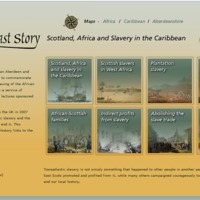
A North East Story: Scotland, Africa and Slavery in the Caribbean
This online exhibition and learning resource linking the history of transatlantic slavery to North East Scotland was organised by an Aberdeen and Aberdeenshire Bicentenary Committee, including representatives from Aberdeenshire Council, Aberdeen City Council, the University of Aberdeen, the Robert Gordon University and the African and African-Caribbean communities. It followed on from a service of commemoration and a series of public lectures sponsored by the Committee in 2007. The exhibition logo is inspired by the mythical Sankofa bird, a cultural symbol of the Akan-speaking peoples of Ghana in West Africa. Featured here are a number of resources available to download from the North East Story website.
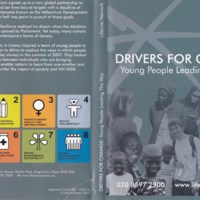
Drivers for Change: Young People Leading the Way
Drivers for Change was a project led by LifeLine Network, a network of partnerships between community organisations and NGOs with a common aim to fight poverty. In Summer 2007, a team of young people visited Zimbabwe, Sierra Leone and Dominica to explore the ways in which people were combating modern slavery. The trip was inspired by two significant points in history: the 1807 Abolition Act, and the half way point of the Millennium Development Goals, for which 189 nations signed up to a new global partnership to reduce extreme poverty. While in Africa, the group looked at how global partnerships between individuals bring communities together, and assist in countering the impact of poverty and HIV/AIDS. A film was produced documenting the trip, launched at an event was held at the Palace of Westminster.
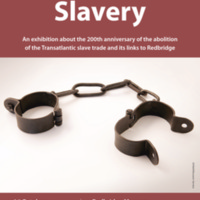
Redbridge and Slavery
Redbridge Museum's exhibition to mark the bicentenary examined the London Borough of Redbridge's connections to the slave trade and abolition. These links included local resident Josiah Child, once Governor of the East India Company, an investor in the Royal African Company and owner of plantations in Jamaica. The Mellish family of Woodford had connections with the West India Docks in London, built for the sugar trade. Alexander Stewart of Woodford owned Jamaican plantations and acted on behalf of owners of enslaved Africans in compensation claims after abolition. The exhibition also examined church records detailing some of the Black residents of Redbridge in the 17th and 18th centuries. Music from the Caribbean island of Dominica was included, as was a series of personal responses to the bicentenary by local residents.
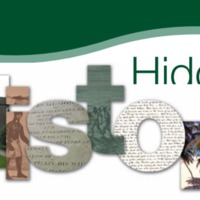
Hidden History of the Dales
This project was a collaboration between the Dales Countryside Museum in Hawes and North Yorkshire Record Office to research people and places of the Yorkshire Dales connected with Africa, the Caribbean and India. 'Hidden History' collected local stories of slave owners and traders, abolitionists, Africans and Asians who moved to the Dales, and others like the actor Ira Aldridge who passed through. The project included various community activities. Working with actor Joe Williams, pupils from the Wensleydale School explored the life of Olaudah Equiano and performed alongside Joe at the exhibition opening. There were drop-in sessions on exploring family history, carnival costume making, talks and music. The exhibition toured to other locations in Yorkshire, including Boroughbridge Library. The Dales Countryside Museum has continued to collect information relating to individuals who were connected with the Yorkshire Dales and the wider world.
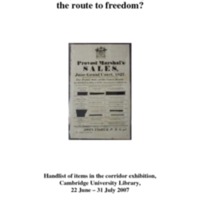
Slavery, shackles and sugar: the route to freedom?
Cambridge University Library held a small exhibition in 2007 showcasing its collections of rare books and manuscripts relating to slavery and abolition. These include records of the Greg family, who owned a sugar plantation in Dominica, and documents relating to slave compensation for the West India colonies. Other records held by the library relate to British Quakers, the abolition campaign, and the persistence of slavery in the 20th century and into the present day.